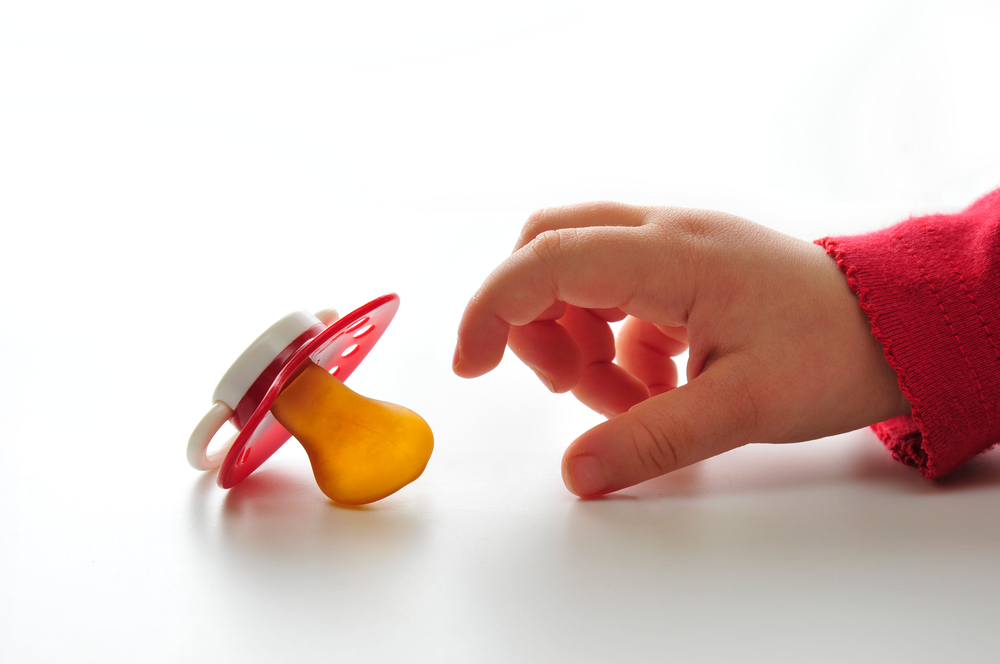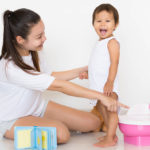
Sucking is a primitive reflex that is necessary for your baby to eat and drink.
For most babies, sucking also has a soothing and calming effect, and because of that, apart from your own nipples, a pacifier is possibly the next best thing that works exceedingly well in restoring contentment in your baby.
What a pacifier can do
A pacifier may be able to assist you in taking care of your baby and reduce possible stress from being a caregiver in a few ways.
Soothing a fussing baby
A suckling baby is usually contented. If you are having an unusually difficult day settling your baby and/or if you baby is feeling discomfort or unwell, it may help to calm him down.
A distraction
A pacifier can be useful as a distraction during air or long distance travels, after vaccination shots, blood tests and other procedures that may be necessary from time to time.
Reducing the risk of Sudden Infant Death Syndrome (SIDS)
According to the American Academy of Pediatrics, sucking on a pacifier safely during naps and bedtimes is associated with a reduced risk of SIDS by 90%. What’s more, pacifiers also eliminate the risk associated with babies who sleep on their stomach or soft bedding – both of which have been shown to increase the risk of SIDS.
A habit that is easier to break
Unlike your baby’s thumb or fingers, a pacifier is not as easily available to your baby and it is disposable. In this sense, a pacifier habit may be easier to break when you are ready for your baby to wean off his reliance.
Possible side effects of a pacifier
While a pacifier can be useful, there has been much debate about its use because of the possible side effects that could come with long-term usage.
Latex allergy
Some babies could have an allergy to latex. Symptoms may include hives, itching, stuffy or runny nose. It can cause asthma symptoms of wheezing, chest tightness and difficulty breathing.
Thrush
According to the Seattle Children’s Hospital, oral yeast or thrush is a common fungal infection in babies that occurs on parts of the mouth involving sucking. Your baby might be more prone to thrush or may experience a more severe case of thrush if they spend too much time sucking on a pacifier. Thrush can be transferred to a mum’s nipples through breastfeeding.
Middle Ear Infection
According to SingHealth, continuous sucking on a pacifier may predispose your baby to a middle ear infection, which is the transmission of bacteria in secretions from the throat into the middle ear.
Dental problems and repercussions
According to the American Academy of Pediatric Dentistry, long-term pacifier use could affect the growth and development of your baby’s jaws, tongue, facial muscles and alignment of teeth which may, in turn, affect your baby’s appearance, speech and chewing.
Dependency
Your baby may become so attached to his pacifier that it becomes very difficult for him to give it up later on.
Using a pacifier for breastfed babies
There has long been debate on the use of a pacifier for breastfed babies. Some of the main concerns against introducing the pacifier for breastfed babies include:
Nipple Confusion
The mechanics of sucking on a real nipple and sucking on a pacifier is different, although they may seem similar. Introducing a pacifier too early in your baby’s life could cause your baby to be unable to latch on in the manner necessary for milk to be dispensed from your nipple. This can affect your success in breastfeeding.
Interference with milk supply
As milk supply is established by your baby’s demand, you are likely to produce less milk if your baby sucks on the pacifier instead of latching on to nurse.
Weight loss and nursing problems
Introduction of a pacifier to your baby may cause him to want to nurse less from being satisfied in terms of his sucking needs. This could result in weight loss in your baby or cause you to suffer from sore nipples, engorgement, plugged milk ducts, and mastitis.
Sleepy baby
Sucking on a pacifier could make baby sleepy or too tired to nurse, making breastfeeding more difficult.
Tips for pacifier safety
There are pros and cons to using a pacifier. If you should decide to use one for your baby, here are some pacifier safety tips that will make it a safe experience for your baby.
Keep it clean
Keeping the pacifier clean is absolutely one of the most important pacifier safety requirements since pacifiers are popped directly into your baby’s mouth. Be sure to thoroughly clean and disinfect the pacifier, taking care to squeeze any excess water out of the nipple with clean hands. You may wish to have some extra pacifiers on standby for situations where they fall on the ground or street when you need them most.
Avoid a choking hazard
Remove the pacifier from your baby’s mouth when he has fallen asleep to avoid having him choke on it.
Avoid a strangling hazard
Do not give a pacifier to your baby hanging from a cord, string or ribbon during sleep and/or without supervision, particularly for very young children. These cords could accidentally strangle your baby.
Replace when expired
Pacifiers fall apart over time and they have expiry dates indicated by their manufacturers. Do not keep pacifiers pass expiry and remember to inspect them regularly to see if the rubber has changed colour or if it is torn. If so, replace them.
The decision of using a pacifier for your baby, or not, is personal and should be considered carefully after fully understanding your family’s needs versus what a pacifier may be able to do for you.
It appears that short term, sparing pacifier use may even help you and your baby thrive in this new motherhood journey – just remember to pay attention to pacifier safety if you do choose to use one for your baby.























